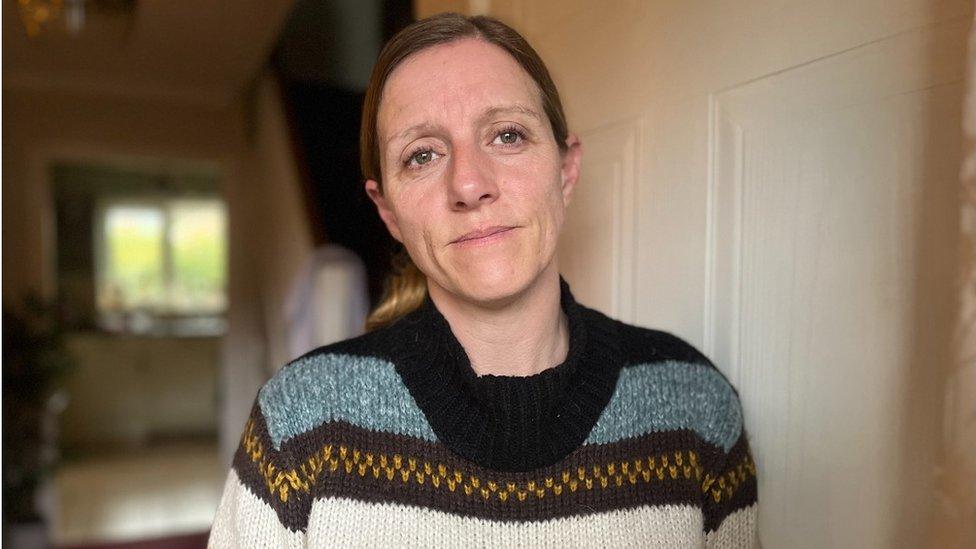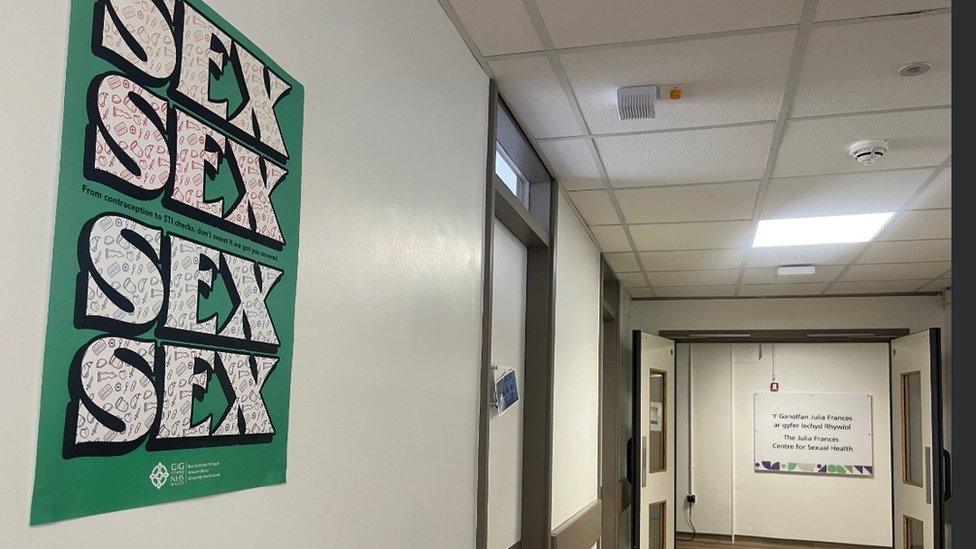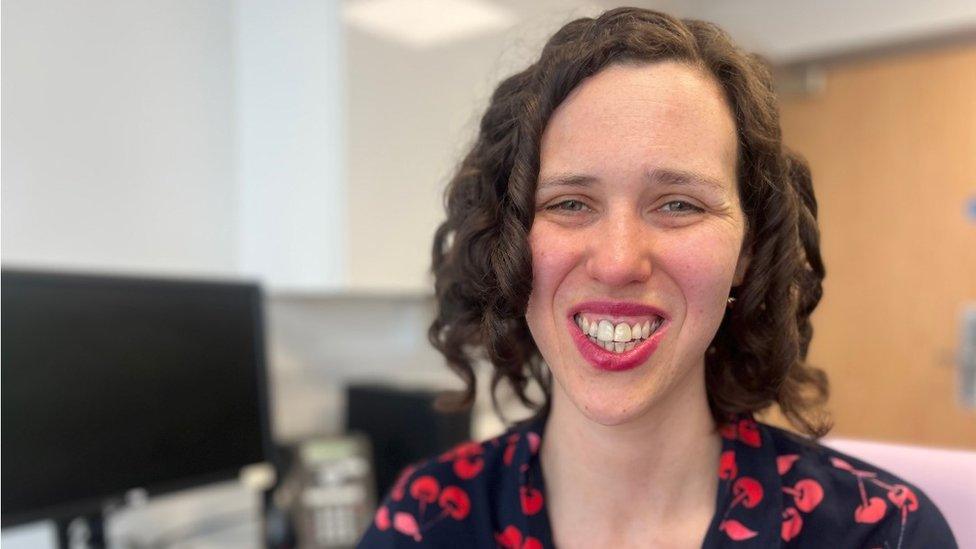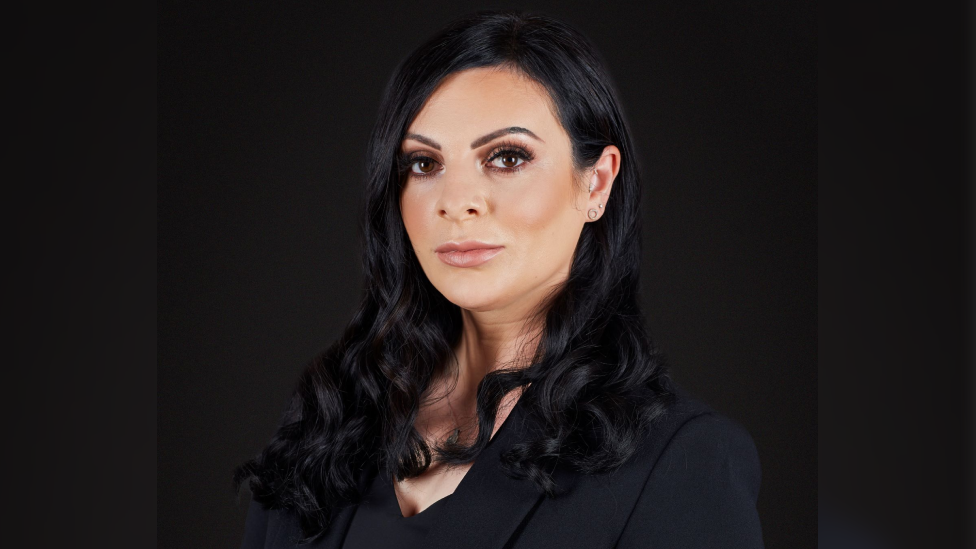Coil fitting wait leaves woman in excruciating pain
- Published

The wait for a coil to be fitted dominated Gail Adams's life and stopped her socialising with friends and partner Richie
"You sweat profusely and you feel violently sick and you're crying out, the pain is so bad."
Gail Adams, 48, says delays in having a coil fitted left her in "excruciating" pain with endometriosis, and she was unable to work for three months.
Some patients in her area are waiting nine months for a coil - also used for contraception - to be fitted, compared to two weeks in most of the country.
Cardiff and Vale health board said it has 900 people on its waiting list.
A spokesperson said services were experiencing "significant and sustained pressures nationally", adding that "colleagues are working tirelessly to see patients in a timely manner".
Hormonal intra uterine devices, also known as coils, can be used to help treat endometriosis, external, a painful condition thought to affect one in 10 women, where tissue similar to the womb lining grows in other places outside the uterus, sticking organs together.
The hormonal coil, the copper coil and the implant are primarily used to prevent pregnancy and should be free and easy to access through NHS services.
For Gail, a short appointment to fit one could have changed everything.

Gail Adams says the wait had an huge impact on her life
Instead the English teacher relied on hot water bottles and daily strong painkillers to cope with the constant "dull ache" of living with endometriosis.
Options included Gail's GP telling her about replacing her hormonal coil that would help treat the endometriosis and reduce her symptoms, but there was a four-month wait for this.
She described a flare-up as feeling like "birthing pain", and it dragged all down her legs, back, hips and stomach.
The pain was so bad that she stopped working for almost three months and stopped socialising as she waited for her appointment.
In the meantime, Cardiff and Vale health board's sexual health services put her on a seven-month waiting list.
"It's completely debilitating," she said.
"The only option is to double up on my painkillers and knock myself out."

People with endometriosis have to wait alongside people wanting the coil for contraceptive purposes
An appointment to fit a coil takes about 30 minutes, with the actual fitting about five minutes.
Cardiff Royal Infirmary currently has 900 people waiting for a coil or implant.
Gail was recently offered a last-minute cancellation from her GP, and while she feels grateful, is concerned about others having to wait. She has now had the procedure, but remains off work.
"I still have the pain, but it's slowly getting better," she said
"There are so many women who are really fighting and advocating for themselves to get very simple procedures done for a very debilitating and life-changing illness."
Most of Wales' health boards reported waits of two weeks for a fitting after an initial contact, with the second longest wait being seven weeks in the Hywel Dda area of west Wales.
However, within Cardiff and Vale, it was between five and six months.
But some clinicians suggested to BBC Wales that some patients are waiting eight or nine months.

Dr Georgina Forbes believes there should be more impetus from government officials to improve the situation
A health board spokesperson encouraged patients to call its concerns team, adding: "We are sorry to hear of this patient's experience and understand how difficult it is for patients who wait a long time for treatment."
There is "not an equitable service for the women of Wales" is how Dr Georgina Forbes described the situation.
The Wales chairwoman of the Faculty of Sexual and Reproductive Healthcare, external said there was a real variety of waiting times across the country.
She said that before Covid, meeting demand was difficult, but since the pandemic, coils and implants were "put on the back burner", leading to backlogs.
Dr Forbes, who works for the Aneurin Bevan health board, also said drop-in clinics had closed while staff training and retention was an issue.
"In the meantime, you're still getting that same weight of referrals every week and the same number of women are ringing every week, it's really difficult to get that amount down," she said.
'Pressure on trusts'
Dr Forbes pointed out that it was not only fitting, but also removing coils that was an issue, potentially delaying women's ability to conceive.
In its latest report, Public Health Wales recorded a 34% increase in the number getting abortions, external in the five years up to 2021.
Dr Forbes said there was a partial link between abortion and contraception rates, adding: "If we're diverting our workforce to abortion care, we're not solving some of the problem of the rising abortion rates."
Dr Forbes called for more "impetus" from the Welsh government, "putting some pressure on trusts to provide the service within a timely manner".
The Welsh government said it was "committed to ensuring access to a range of contraception options, provided safely and effectively by confident and competent fitters".
"We expect all health boards to take positive action to improve the experiences and outcomes of women and address any inequalities," it added.
"NHS Wales is developing a comprehensive 10-year women's health plan.
"This will act as the vehicle for transforming the care received by the women of Wales."

A POSITIVE LIFE: HIV from Terrence Higgins to today
ACID DREAM: The Welsh farmhouse that sparked a revolution of the mind

Related topics
- Published27 June 2021

- Published13 July 2021
